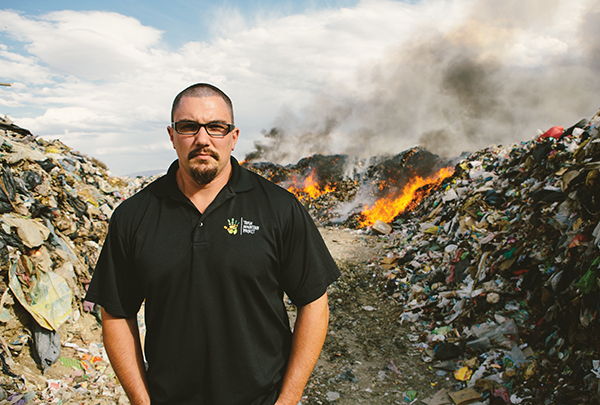Trash Mountain
Alumnus works internationally to defeat extreme poverty

From The Ichabod - Spring 2019
Brett Durbin knew he had a good life growing up. He went to school in the Washburn Rural school district in Topeka, Kansas. He came to Washburn and earned bachelor’s and master’s degrees in criminal justice, and his wife earned her degree in management. Their parents had nice jobs, but instead of following them in their careers, they felt a call to serve others.
“We saw the need in the world, and it really hit us,” he said.
It was a short talk with a friend in Florida one day where Durbin, bs ’03, mcj ’05, first heard of a trash dump community – a group of people who live on and dig through landfills in search of food or items to sell. Durbin had just finished seminary, and was a pastor at a local church, but after hearing about trash communities, he knew he needed to travel to Honduras to see the situation for himself.
“I had seen some really bad situations,” he said. “This was on a different scale. The people are living in trash. We have heard people say they feel a part of the trash as they are looking for something to eat or sell. All the humanity is stripped out of their eyes at the age of 3 or 4.”
Driven by their faith in God and in response to what they saw, Durbin and his wife, Jaelle, bba ’02, created the Trash Mountain Project, which works to develop partnerships with local churches, individuals and organizations to bring sustainable change to communities that surround or depend on a landfill to live. The solutions they are working on must be sustainable as the problem is multi-generational. Children start helping their parents dig through the landfills when they are very young, and it often leads to disease, malnutrition and violence among gangs and families. It becomes a cycle that is hard to break.
“We didn’t know how we could help, but we said we were in,” he said after visiting his first trash community. “We were told not to move there, and that by living in America, we had resources and influence like we couldn’t understand. They needed us to take their story and help them resource the solution.”
Marking its 10-year anniversary this year, the Trash Mountain Project works to help the families solve the problems that created a trash dump community in the first place. While they are working to stay at the forefront of research on how to solve the problems, they are focused on six key areas: nutrition, education, discipleship, health care, infrastructure and livelihood.
In addition to gangs and violence in the trash communities, there are no homes, schools or infrastructure, and Durbin said residents didn’t even understand the concept of health care.
“We don’t know anything like this in the United States because we have laws against this,” he said. “There are a few organizations focused on feeding children in these communities, but we need to focus on the problem causing it, and that’s what the Trash Mountain Project does.”
Ten years in and Durbin has personally traveled to 59 trash communities, and the Trash Mountain organization is currently working with 12 of them in five countries – Honduras, Dominican Republic, Kenya, the Philippines and an undisclosed location for security purposes. In order for the organization to start working with an area, they first find trustworthy people in the community to partner with instead of sending people from the United States. He believes working with people locally in the area can build trust because their culture is still intact.
Some staff have moved from Florida to the Topeka area, including Timm Collins, a former pastor and now chief operating officer of the Trash Mountain Project, because their philosophies have aligned in how to help people living in trash communities.
Collins recently traveled to Honduras to attend a high school graduation in one of the trash communities. It's successes like these that the organization is motivated by - seeing one of the girls in the school in another TMP partner community go off to the college and come back to help the organization, and seeing gangs and violence start to leave the area.
“We don’t want to enable unsustainable lifestyles,” Collins said. “Long-term sustainability is a core value of this organization. You don’t change the world by propping them up, but by giving them a foundation to stand on.”
Durbin is running this international organization from northeast Kansas for one reason – the people. He was still living in Florida when he initially launched this project, but today, almost 80 percent of the volunteers and resources come from Topeka and northeast Kansas.
“This is a very giving city,” he said. “They are very generous, and they just respond. Whether people live in the Philippines or Topeka, they understand we are neighbors in the human family.”